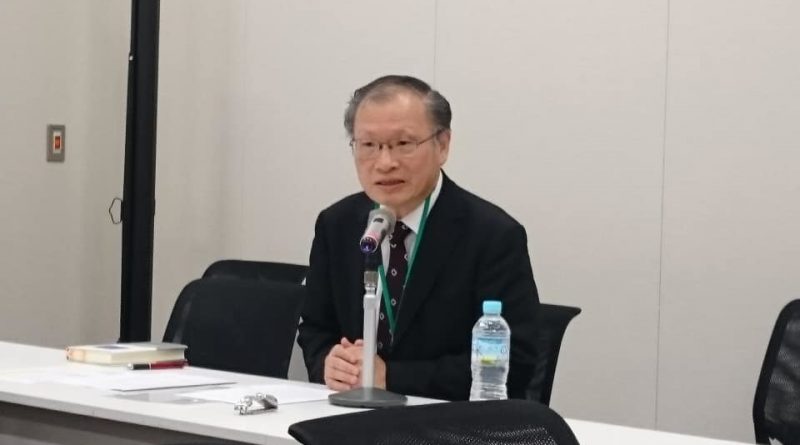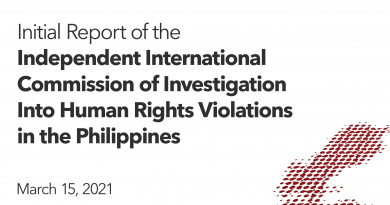Interview with Rev. Kim Sungjae, General Secretary, NCCJ
Rev. Kim Sungjae, General Secretary, NCCJ
1. Prime Minister Suga recently rejected the appointment of six people recommended by the Japan Association of Sciences, and what kind of repercussions has this caused in Japanese society?
During the war period lasting until 1945, the imperial government based on national Shintoism suppressed critical studies and thoughts on the Emperor and his policies, and there were cases in which professors of national universities were expelled (e.g., the Takigawa Incident in 1933 and the Minobe Tatsukichi Incident in 1935). Reflecting on this history, in 1949, the Japanese Academic Conference (JAC) was established as a national institution, and the JAC act stipulated that the members of the JAC are recommended from among themselves but appointed by the Prime Minister. In 1983, former Prime Minister Yasuhiro Nakasone reaffirmed the spirit of the JAC act, saying at the National Assembly that the prime minister’s appointment is just “formal.” It has been taken for granted that such a process would guarantee “academic freedom” as stipulated in the Constitution.
However, the Suga administration, which reviewed the list of 105 new candidates recommended by the JAC at the end of the Abe administration, announced the final list on October 1, excluding six scholars the JAC recommended. Asked why the six were excluded, Suga and Kazuhiro Sugita, Chief Cabinet Secretary responded that they judged from a general perspective and that they are legally authorized to supervise and appoint the JAC members. They did not give any further reason. Even now, the opposition lawmakers’ questions have remained unanswered. On the contrary, ruling party lawmakers are attempting to water down the issue of “academic freedom” by insisting on academic reform, stressing internal problems within the JAC.
One fact has been revealed during the National Assembly debate on this matter so far, that all six scholars who were denied the appointment were scholars of the humanities and social sciences. In addition, all of them mentioned that, “the Security Laws passed in 2015 at the National Assembly is unconstitutional according to Article 9 of the Constitution,” or made critical comments on the issue of the U.S. military base in Henoko, Okinawa. Despite other members of the academic community who made similar comments, there is speculation that excluding the six may be to set an example.
A bigger issue is that after checking the list of 105 people, the prime minister himself was found to have not reviewed all 105 names because the list submitted to him was already missing the six names. Eventually, it turned out that it was Kazuhiro Sugita, Deputy Chief Cabinet Secretary who had excluded the six scholars. Kazuhiro has been working behind the scenes with close ties with Suga since the Abe administration.
One thing to worry about and to be careful of in the future is that if the Suga administration does not appoint these six scholars without acknowledging their legal mistakes, we could face a serious situation in which “academic freedom” is further violated. In other words, it is feared that the government will be able to intervene in the personnel affairs of educational institutions and demand a narrow nationalism in all educational content.
Another problem is that only about 30 percent of Japanese people are critical of the government’s behavior on the appointment issue, which is that the majority are indifferent to right or wrong. There is so much political indifference among the people. Japanese democracy faces a crisis as many people do not take the concept of liberty as human rights seriously enough.
2. What is the Suga administration’s attitude toward amending Article 9 of the Constitution?
In May 2017, Abe announced that he would complete the constitutional amendment during his term of office. But after failing to win two-thirds of the ruling party in the House of Councilors, he found himself in a difficult situation. In other words, the National Assembly should enact a referendum law before the referendum, which calls for only a majority vote. But the Constitutional Review Committee, which handles the bill, has failed to speed this up because of a slew of problems it has to address, and the opposition party has strictly criticized the ruling party’s proposals and opinions. In addition, in the midst of COVID-19, Abe resigned because of health reasons, failing to make a full-fledged constitutional amendment. Also, in the wake of the U.S. presidential election transition, Suga has not made any clear comment on the constitutional amendment since his inauguration.
What we need to note is that Abe, before his resignation, wanted the Suga administration to legislate a bill allowing for preemptive strikes on enemy states in case of emergency. Regardless of the outcome of the U.S. presidential election, Japan will take the lead in the security strategy of the U.S. in East Asia. The U.S. will also demand Japan’s proactive role.
But if Japan decides to conduct preemptive attacks on enemy states’ military bases, it would be a far more significant violation of Article 9 of the Constitution than the 2015 Security Law. For this reason, in the eyes of citizens participating in the peace movement, I think that the Suga government is more dangerous than the Abe administration.
3. What do you think of the new U.S. Biden administration’s Northeast Asia policy, including its policy toward Japan?
On November 24, President Trump finally acknowledged Joe Biden’s presidential election victory. However, it is still unclear who is in charge of Northeast Asia area under the Biden regime, so it is expected that the Suga government will watch the situation a little longer.
First, the Suga government will observe the Biden regime’s China policy. On November 24, Japanese Foreign Minister Motegi met with his Chinese counterpart Wang Yi in Tokyo. We expect that the Biden regime, unlike President Trump, will take an approach of negotiation and compromise to China rather than confrontational diplomacy. In this calculation, the Suga government will also be seeking ways to improve Japan-China relations, including President Xi Jinping’s visit to Japan, which has been suspended due to COVID-19.
With regard to Korea policy, compared to President Trump’s personal and unorganized approach to North Korea, I think the Biden regime will develop prepared and organized policies towards North Korea. The Suga government may find Biden’s administration more stable than President Trump’s as Biden will surely relate the ongoing sanctions to the denuclearization of the DPRK.
Under these circumstances, we must watch carefully whether the Suga administration will seek the path of normalizing diplomatic relations with North Korea, and we also need to see how Suga maintains a cooperative relationship with North Korea. At the same time, we have to see how the Kim Jong Un regime reorganizes its policies towards South Korea and Japan.
There are many problems in hosting the 2021 Tokyo Olympics. Currently, Japan has a huge debt amounting to 260 percent of its GDP, and the government has tried to convince the people that hosting the Olympics will bring about an economic recovery, just as the Tokyo Olympics did in 1964. The “two-dimensional quantitative easing” is a financial policy that allows the Bank of Japan to issue currency without limitation which is used for restoring the economy hit by the COVID-19 and for preparing the Olympic games. Many questions are raised about whether these stimulus measures can help overcome the economic crisis.
The plenary session of the National Assembly will begin in January next year, and it is not clear whether the House of Representatives will hold a general election as soon as it opens, and in this case we have to see whether people will support the Suga administration. So I think the situation of uncertainty will continue until next spring.
-Translation: Shin Seung-min, Kurt Esslinger



